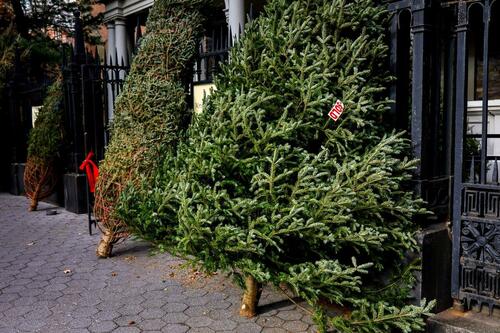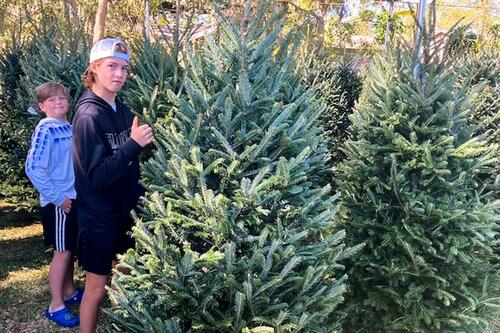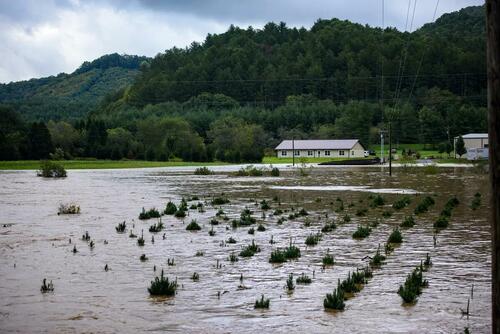Authored by John Haughey via The Epoch Times (emphasis ours),
Americans will buy at least 25 million fresh-cut Christmas trees this year but the best one of them—the pinnacle in pine perfection—is the 8-foot Fraser Fir from Laurel Springs, North Carolina, that sold for $145 about 12:30 p.m. Nov. 30 on a church lawn in Lakeland, Florida.
 A "sold" Christmas tree is seen at Tree Riders NYC in front of St. Mark’s Church-in-the-Bowery in New York City on Dec. 14, 2023. Michael M. Santiago/Getty Images
A "sold" Christmas tree is seen at Tree Riders NYC in front of St. Mark’s Church-in-the-Bowery in New York City on Dec. 14, 2023. Michael M. Santiago/Getty ImagesSo decreed yule arborists Mason Hayes, 14, and his brother, Jackson, 11—the specialists who found their perfect Christmas tree after an hour of foraging through Booger Mountain’s trees at Ardella Baptist Church on a sunny Saturday in central Florida.
“It has to be fat—no gaps at the top or the bottom,” Mason said, rejecting one tree after another.
“It has to be skinny and have no gaps anywhere,” Jackson said, tugging gently on branches to assess tree needle quality.
Following her sons in the shifting sun-speckled shade of live oaks, Amy Hayes could only wait until the experts agreed on what tree would exude Christmas cheer through their living room windows for all the world to see.
When they found it—a fat and skinny fir without gaps but with tenaciously anchored needles—they agreed it was “The One.”
At $145, it’s expensive, Amy said, but The One is worth it.
“We’ve been coming here for five, six years,” she said, noting she believes Booger Mountain’s trees are better quality than those sold in parking lots by Walmart, Home Depot, Lowe’s, and grocery chains.
Booger’s trees “last longer, smell better,” Amy said. “And I like to support local small business when I can.”
That’s small business with a big ‘B,’ according to the National Christmas Tree Association (NCTA), which projects 100,000 seasonal workers will sell between 25 million and 30 million trees for a cumulative $1.38 billion in the United States during the 2024 holiday season.
When including artificial trees, wreaths, lighting, and other accessories, the 2024 Christmas tree market projections top $5.6 billion, according to Market Research Pulse and the American Christmas Tree Association (ACTA), which primarily represents artificial tree retailers.
 Mason Hayes, 14, and his brother, Jackson, 11, ferret through a forest of fresh-cut firs from North Carolina for the perfect Christmas tree at Booger Mountain Christmas Trees at Ardella Baptist Church, in Lakeland, Fla., on Nov. 30, 2024. John Haughey/The Epoch Times
Mason Hayes, 14, and his brother, Jackson, 11, ferret through a forest of fresh-cut firs from North Carolina for the perfect Christmas tree at Booger Mountain Christmas Trees at Ardella Baptist Church, in Lakeland, Fla., on Nov. 30, 2024. John Haughey/The Epoch TimesNCTA spokesperson Jill Sidebottom said 2024 is shaping up “like a pretty normal season” with a healthy tree crop ready for trimming.
“The 2024 harvest across the country, in different places ... there are issues,” she told The Epoch Times. “It was very wet in the spring and it was a dry summer in the Northeast. That affected [trees] in Pennsylvania and Maine. In North Carolina, we had this storm and a lot of young trees died. But for the most part, the taller trees were not damaged.”
North Carolina is second only to Oregon in Christmas tree production, according to the NCTA, followed by Michigan, Pennsylvania, Wisconsin, and Washington.
NCTA, which represents about 15,000 tree farms, 38 state and regional associations, and more than 4,000 businesses, selected a North Carolina Fraser Fir from a farm damaged by Hurricane Helene as the “national tree” for the White House, Sidebottom said.
“The great news is [North Carolina] trees came through, in most cases, in really great shape,” Real Christmas Tree Board Executive Director Marsha Gray told The Epoch Times.
“Several farms in low-lying areas did receive a lot of damage,” she said. “The majority are grown on the sides of mountains so the water was below them. [Growers] had some issues and concerns with infrastructure” but roads and railways recovered rapidly.
The Real Christmas Tree Board, which represents the industry before the United States Department of Agriculture (USDA), surveys growers nationwide every September to forecast supply for the coming season.
“They gave us a very positive response,” Gray said, noting that these growers sell two-thirds of Christmas trees bought across the United States. “The quality was good, no concerns with shipping, and 60 percent said they did not plan to raise wholesale prices this year.
“We are ready,” she added, “and we are excited.”
 Growing Christmas trees are seen in high water from flooding of the New River in Ashe County, N.C., on Sept. 27, 2024. Melissa Sue Gerrits/Getty Images
Growing Christmas trees are seen in high water from flooding of the New River in Ashe County, N.C., on Sept. 27, 2024. Melissa Sue Gerrits/Getty ImagesIndustry in Transition
The biggest issue with the 2024 holiday season is the calendar, Sidebottom said. “The oddest thing about this season is Thanksgiving is so late this year. A lot more places opened the weekend before Thanksgiving.”
The future of the industry faces potential disruption from tariffs if President-elect Donald Trump follows through with proposed levies on imported goods, including from Canada, which produces nearly 30 percent of Christmas trees sold in the United States, and from the same corporate pressures that are driving independents and family-run farms out of the agriculture industry.
“Oh gosh, I have no idea” how tariffs could affect tree prices next year, Sidebottom said. “We have a group from Canada that is part of our association and are represented on the [USDA] board. They’ve been shipping trees since the 1950s.”
Gray said the board is “not allowed to comment on public policy” but noted that Trump’s tariffs are on growers’ minds. “We’re all going to watch and see what happens,” she said.
Rocco Malanga, owner of Cedar Grove Christmas Trees, a South Florida tree wholesale distributor and retailer, had no such reservations.
“We fully support President Trump’s proposal to shift toward a tariff-based economic system, which we believe will be transformative for the Christmas tree industry and countless other sectors,” he told The Epoch Times.
For years, he said, Canadian imports benefitted from the weaker Canadian dollar, allowing them to undercut U.S.-grown trees in price.
“A tariff on imported Christmas trees would help level the playing field, redirecting demand toward American growers and empowering local farms and businesses,” Malanga said.
Cedar Grove Christmas Trees has longstanding relationships with growers in Wisconsin, Michigan, and Pennsylvania, who have “faced some of their toughest years recently” and would benefit from Trump’s tariffs, he predicted.
It will likely take more than tariffs for independent, family-owned growers to survive in a market increasingly dominated by corporations.
Read the rest here...
Source link

